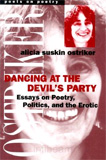Review by Moira Richards 
DANCING AT THE DEVIL’S PARTY: ESSAYS ON POETRY, POLITICS, AND THE EROTIC
by Alicia Suskin Ostriker
University of Michigan Press
839 Greene Street
Ann Arbor, MI 48104-3209
ISBN 978-0-472-09696-1
2000, 136 pp., $14.95
http://www.press.umich.edu
I devour books like this. I live across the world from Alicia Ostriker and my education barely touched on poets in the USA–even less on their women poets–so I need engaging and accessible essays like these to learn what more I want to know. Dancing at the Devil’s Party, as the subtitle suggests, comprises six essays that explore aspects of love and politics, the politics of love, and most interesting to me, the politics of gender. The essays look in the main at the works of Walt Whitman, Elizabeth Bishop, Sharon Olds, Maxine Kumin, Lucille Clifton and Allen Ginsberg. I’ll touch on four of them here.
In the opening essay, “Dancing at the Devil’s Party: Some Notes on Politics and Poetry,” Ostriker asks and answers her own questions about poetry and politics and whether or not poetry can change the world we live in. She ends up in the exciting world of feminist writing:
What then is important in contemporary women’s poetry? What follows from women’s cultural marginality and their equivocal relation to a canon that they appropriate, resist, and transform? First of all, there is the discovery that marginality, however painful, may be artistically useful.
Fighting words indeed! And in another essay, about the work of Elizabeth Bishop and Sharon Olds, “I Am (Not) This: Erotic Discourse in Elizabeth Bishop and Sharon Olds,” Ostriker takes that feminist approach to the way the poetry of those two women is often misread, misunderstood–perhaps “pigeon-holed” is a better word–by patriarchal readings. She looks at marginalisation and argues and illustrates her points with lines of poetry in a way which is both inviting and accessible for a lay reader like me. Perhaps the cornerstone of this essay is her point that:
Bishop mostly evades, Olds mostly asserts erotic connection – but for both, the erotic is a power preceding and defining the self; for both, it exists at the liminal border between language and the unsayable; for both, it abuts on a realm we may call spiritual. Technically, however cool the voice of Bishop, however seemingly overheated the voice of Olds, the metaphors of both poets enact the erotic.
I have just recently encountered eco-poetry and its underlying (quite startling, from a western point of view) philosophy of living things. And from Alicia Ostriker I now find that these ideas can be traced back into the poetry of Maxine Kumin. Of her essay on the poetry of Kumin, “Making the Connection: The Nature Poetry of Maxine Kumin,” Ostriker writes that it is the result of:
a sudden hunch that Kumin’s nature poetry was not merely sane. It was revolutionary in the history of nature writing – merely by virtue of refusing to imagine that anything (including ourselves) could possibly be superior to nature.
But the essay that introduces the work of Lucille Clifton, “Kin and Kin: The Poetry of Lucille Clifton,” is the one that has resulted in a number of additions to my wish list at my favourite online bookstore. Ostriker begins by saying:
I would like, in this essay, to show how spiritually complicated an apparently “easy” poet can be – and how a gentle voice can be both revolutionary and revelatory.
Here I learn from Ostriker about a strong black woman poet who (to refer back to the opening quote of this review) has yoked marginality and pain to serve her artistry. South Africa is home to many such women–women who have been marginalised into invisibility for decades and who are now appropriating their rightful place in their homeland. Lucille Clifton’s poems seem to be writing the women of my country who are:
turning out of the
white cage, turning out of the
lady cage
turning at last
on a stem like a black fruit [pg 86]*
Ostriker continues with an exploration of various aspects of Clifton’s biography and her work, covering not only her assertion of herself but the sources of her strength, of her pain and her smoulderingly understated anger. As here:
i got a long memory
and i come from a line
of black and going on women
who got used to making it through murdered sons [pg 92]*
Alicia Ostriker’s enthusiasm and knowledge of this poet and her poetry is really infectious and as I said, the essay has made me hungry to read more of what Clifton has written. In the last lines of the afterword of her Dancing at the Devil’s Party, Ostriker writes that:
From each of the poets discussed in this book I have learned something immeasurable. The essays are by way of thanks.
To which I’ll add that what I’ve learned from Alicia Ostriker through her book is also immeasurable and this review is by way of thanks.
* Lucille Clifton, Good Woman: Poems and a Memoir, 1969-1980 (Brockport, N.Y.: Boa Editions, Ltd., 1987). Page numbers refer to Ostrika’s book.
Comments are closed.